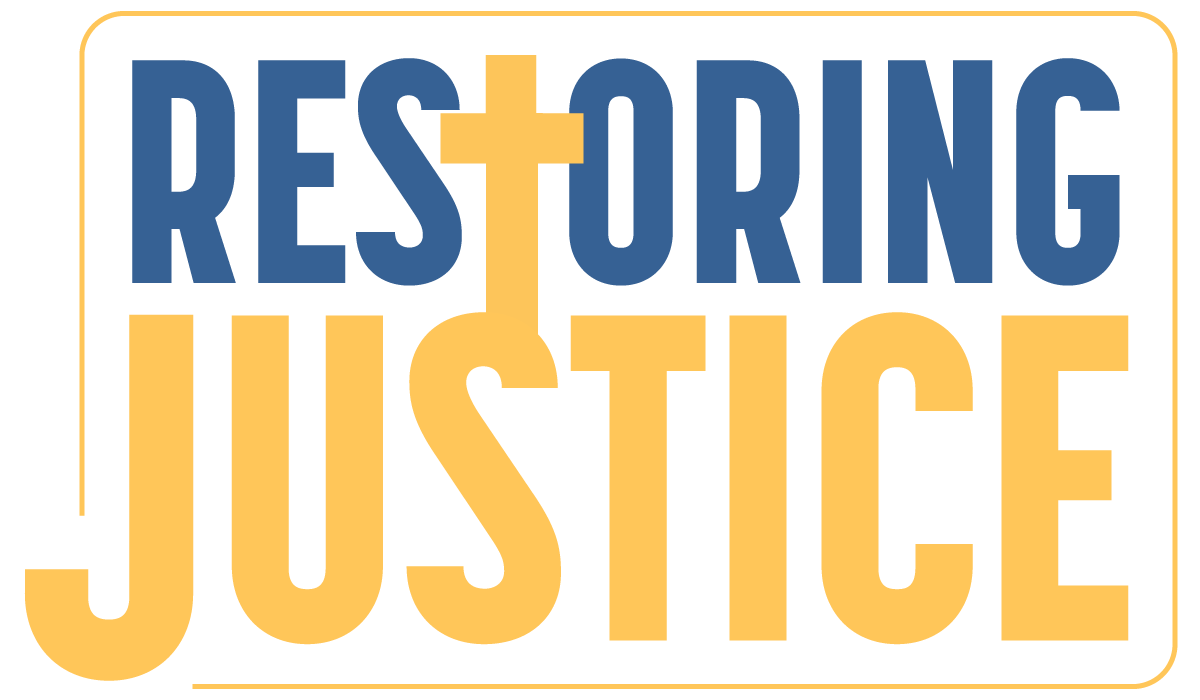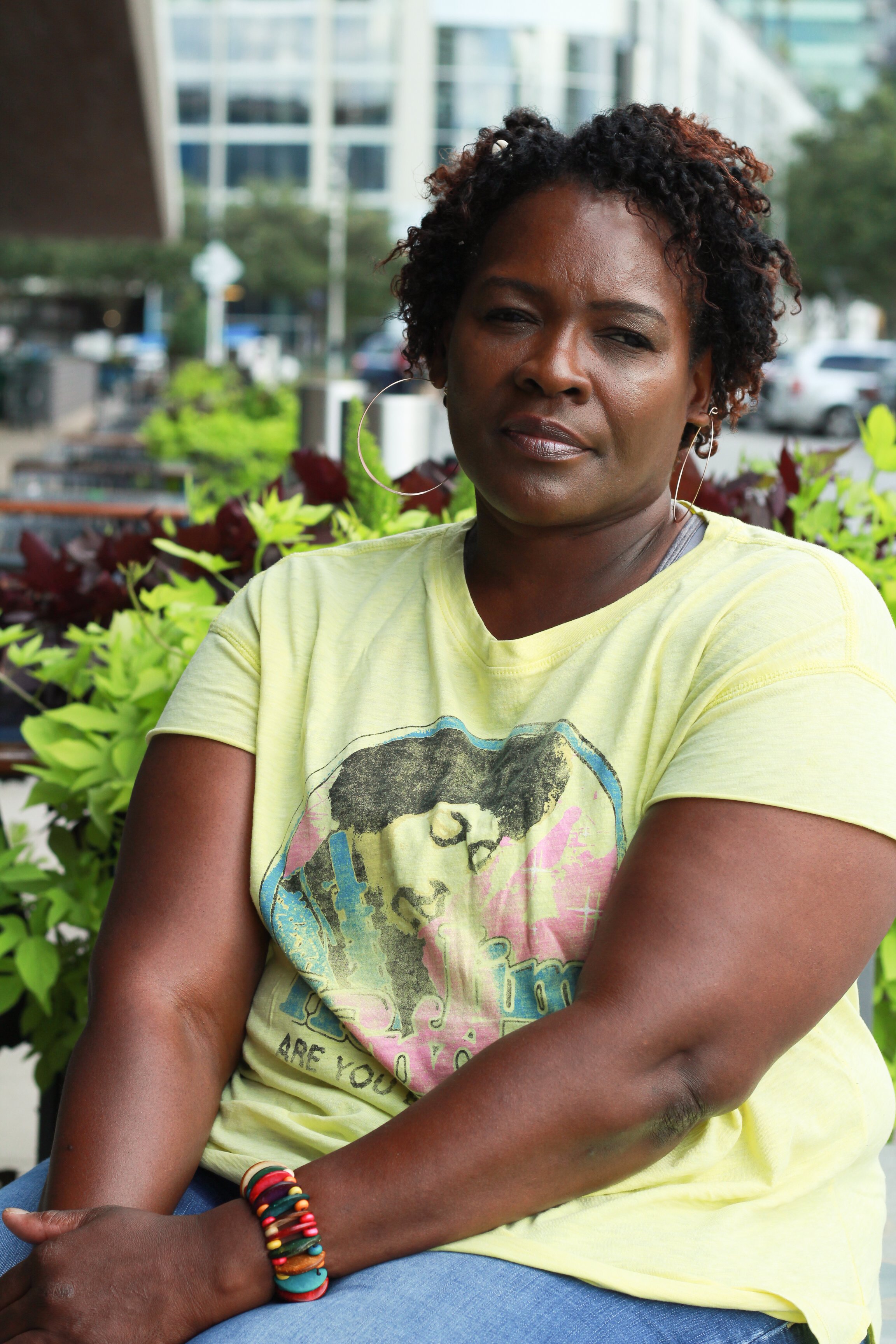'Don't settle': Carol discusses necessary change in the criminal legal system
On a sunny, oppressively warm summer afternoon, Carol joins me in the corner of a grocery store cafe. She is self-assured, taking deliberate care with her words, her arms folded on the table between us. Our client openly reflects on her life, ideals and beliefs, and sharply analyzes the criminal legal system and the gaps in public services for vulnerable people like her.
Speaking with Carol, you realize she carries a sense of peace and intention. Her introspective manner shined through our conversation as she interspersed painful remembrances with pointed moments of insight. "Carol today is someone that is … more approachable today. She's more willing to serve today. She's excited about life. And she wants to know, what is our purpose? To be more blunt about it, 'What the hell am I doing here? What am I here for?'" she says before chuckling. "I was always given negative affirmations that I lived by, growing up in my teen years, part of my adult years, that 'You're stubborn, you're lazy, you're never gonna be anything.' I grew up believing and acting out of those things that I had been taught to believe about myself. Carol today knows that I'm just the opposite of those things. I am loved, because I have learned to love me."
A resourceful woman, Carol lives on her own terms and sleeps in her car: "I know that [physical things] are not what is going to... supply whatever I need in this world – which is to be mobile. Or to have that home. Really, society calls it a home but I call it my castle. Why? Because I haven't had my own home since 2014. So that's just where I am today. It's a beautiful place to be. Is it always sunshine? It can be if I choose to look at it like that. But does it always feel like that? No. It's not easy being...not having a place to sleep at night and you're getting up and having to go out into society…[Others] go home to a bed at night, but you don't. You still have to operate from a different mindset."
On a typical day, Carol is taking care of her immediate needs at a gym she frequents, and there she also does her work. Often she finds herself having meaningful conversations with people passing through, who have maybe overheard her on the phone, and she offers them information about a shelter or organization when they ask. "There's a difference between work and a job. It gives me peace in knowing that, hey, I have spoken to someone that needed to hear, or that I have shared something with someone that is much more greater than giving them $100, so to speak. I have given them a word to give back."
As a Black woman living in what some might call a precarious situation, Carol has had multiple encounters with police and the criminal legal system. In 2019, Carol was in jail and it had her thinking back to her previous experiences. She recalls, "...from being handcuffed, taken downtown, the processing part of it, sitting in jail...you know, not having the things that I need in jail. I thought back to the fact that I had a criminal background and how it was going to be used against me. I had to take that steel brush and just scrape the recesses of my mind and say, 'You know what, no, we're not going to do this again. And I'm going to fight it and I'm going to fight it to the end, I'm going to stand this time. I'm going to stand because I've already lost everything. I haven't been able to get a job. I haven't been able to get housing, I haven't been able to see my children. I haven't been able to travel to see my mom, haven't been able to do any of that.'
Basically, the Harris County Court system and the way that is set up and the way the prosecuting attorneys operate with the [court-appointed attorneys] – it's a game, it's a circus to them. They don't realize how they are taking not just - they don't realize how they're taking the life away from people, but they are taking away the breath that gives that life to people. You don't have to actually die in order for breath to be taken away from you or life to be taken away from you."
In 2019 a federal ruling forced Harris County to begin releasing people accused of certain misdemeanors, like Carol, on a personal recognizance bond, or a no-money bond. But she still had this case looming over her. This time Carol was determined to fight her charges and put her foot down, refusing plea deals brought to her by her assigned attorneys. Not confident in their ability to advocate for her, she asked multiple attorneys to release themselves from her case. She called up Restoring Justice and was unprepared to find a standard of legal defense beyond her expectations. "[Brianna] knew the business, and the most important thing about it is...she was willing to listen to what I wanted. And [I] was just so impressed because I never had a public defender to call me just out of the blue on any given date and say, 'Hey, Ms. Carol, how you doing? Have you given any more thought to your case?' or call to say, 'Well, look, I want to go over some things with you, or that I want to meet with you, we've never met before.' None of the other assigned attorneys were concerned about meeting me or just want to see what the hell I look like. But she wanted to meet you, wanted to talk, she wanted to discuss with you, she wanted to come up with some strategy."
"So Restoring Justice was – they were my team. Brianna was on my team… Not only is she a fighter, but she's also an educator at the same time. And that's critically important for someone who is new to the criminal justice system, and for someone that's different that's been through the system several times. [People have] been taken advantage of and they don't know. People perish for lack of knowledge. I had no knowledge."
Carol holds a unique perspective as she talks about the way homeless women are treated by both service organizations and law enforcement. Once they are identified as homeless, women like Carol are on the receiving end of a "disservice, disregard, and disrespect." For example, there are fewer options for women like her, single with no children, than there are for single mothers with children. As she shuffles between different agencies, Carol wryly observes that not having a physical address remains a barrier to accessing any services. "The first thing they want to know is name, date of birth, social security number, home address. They're dumbfounded when that information comes out, they don't know how to address it, they don't know what to say, they don't have anywhere to guide you to, or a number that they can tell you to call."
For Carol, policing is where the problems of the criminal legal system start. Her car is 15 years old with body damage, and she is more likely to get pulled over because of it. She recounts one night a police officer approached her as she was sleeping in her car. As a woman, her first concern was her safety as she faced an officer who never identified himself. The officer, instead of asking about her welfare or connecting her with services for the homeless, immediately made an assumption and put her in a defensive position.
It's a sad state of mind for police patrol to assume that everyone they stop and question has that ID, home address, family etc, yet when told differently now they want to search for warrants, arrest and detain. I get better treatment when I do not reveal my housing situation versus revealing that I am homeless.
[An interaction] all depends on how the police begins it and how he ends it. They really need to be retrained or they need to hear from, they need to hear from persons that they have interacted with. Where's the citizens' recourse when they have been harmed? We're not going to get that when we get the court! By the time we get to court, it's over! Judgment has already been handed down before we even make the court, and that should not be so.
Where law enforcement lacks the ability to assess and truly help people, Carol points out there an opportunity to create an outreach team that intervenes and helps people through the legal process and with services like housing. Rather than work in tandem to assess a person's basic needs, the criminal legal system and direct service organizations seem to be on their own islands, to the detriment of people in difficult circumstances. "I receive medical services through Harris Health. I go in and meet with my primary care physician, and I'll tell her my situation: 'I'm homeless, I don't have anywhere to sleep.' But the only thing she can write for me is a prescription for knee pain. Why you don't have a hotline or another department, somewhere down the hallway that you can send me to? To get that homeless situation looked at a little deeper, why isn't there a connection with Harris Health and the Coalition for the Homeless? There's a gap there that needs to be closed.”
“There should be an outreach team, so to speak, that the person can meet with. So if that gap was filled with a program or services before the individual ever goes to [arraignment], let [the individual] be shifted over to this particular program or the service providers that [as part of the arraignment] are going to sit down with them to see what's going on with them. When they go before the judge, to see some alternate services can be put in place to where they don't have to be offered a plea deal. They don't have to go to state jail." This echoes something we've heard many times from other clients: the difficulty in navigating various requirements to get help is overwhelming – even for someone with a deep well of experiences like Carol.
This year Carol and Restoring Justice successfully got her case dismissed, and she continues to agitate against state and local government policies. At times active with local advocacy organizations like Texas Organizing Project, Texas Advocates for Justice, and Pure Justice, Carol is clearly driven. She's motivated to be a model "that people can look at and say, 'If she could stand, and be firm, and continue to be the seeker, continue to be the one that wants to put a standard in place. Then surely I can, too.' Because I've learned that people are always watching. They're always watching you. They see your presence...I'm just that one individual that's gone through this not once, not twice, but three times."
Her main advice? Don't settle. "Be that rock, be solid, be firm, be determined. We've got to become a community of people that will not settle for anything less than what's going to move us forward and beyond. What has been we can't continue to recycle."



